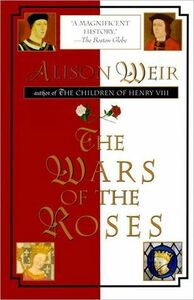You need to sign in or sign up before continuing.
Take a photo of a barcode or cover
Alison Weir writes another great novel, but this one is just a little more detail than I wanted.
Definitely not for beginners! If you've read some about the Wars and are familiar with the characters, I highly recommend this to extend your knowledge and allow more insight on the people involved. Weir definitely delivers on the character insights. I feel like I know the people involved better now! It was not overly wrought with battle details but they're definitely there. I would recommend this History for people who are more interested in the who and the why of the wars versus the what when and how of the wars. Excellent job!!
They created their own "reality show". I love English (well any kind) of history.
The Wars of the Roses was a series of wars from 1455 until 1487 for the throne of England. It is traditionally taught that it was between the houses of York and Lancaster, yet there were a lot more players involved than these two families. In fact the conflict started much earlier with the children of Edward III and Philippa of Hainault. The Lancasters were the descendants of John of Gaunt and his wife Blanche of Lancaster while the Yorks were descendants of Edmund of Langley Duke of York. This was a series over the question of who had the strongest claim to the throne. This question and the series of wars that would try to answer it is explored in depth in Alison Weir’s book “The Wars of the Roses”.
Alison Weir explains the struggle of studying this time period and what she is trying to accomplish in her book:
Sources for this period are meagre and often ambiguous, yet much research has been done over the last hundred years to illuminate a little for us what is often described as the twilight world of the fifteenth century. Many misconceptions have been swept away, yet even so the dynastic conflict still confuses many. My aim has been throughout to eliminate that confusion and try to present the story in chronological sequence, clarifying the problems of the royal succession in an age in which no certain rules of inheritance applied. I have also tried to bring the world of the fifteenth century to life by introducing as much contemporary detail as space permits, in order to make the subject relevant to any read, academic or otherwise. Chiefly, however, I have tried to re-tell an astonishing and often grim story of power struggles in high places that involved some of the most charismatic figures in English history. (Weir, xix).
Weir begins her book by explaining what England in the fifteenth century was like before diving into the history of Edward III and the Plantagenets in the late 1300s. This may seem a little complex since there were many sons of Edward III, but the throne first went to Richard II, but when he was forced to abdicate, the throne went to Henry of Bolingbroke, who became Henry IV. He was the son of John of Gaunt and Blanche of Lancaster. John of Gaunt and his third wife Katherine Swynford had children who would become known as the Beauforts. They would become important later on.
Henry IV’s son would become Henry V who was married to Katherine of Valois. When Henry V died, their son Henry VI became king; he was a baby. His mother would remarry a Welsh man named Owen Tudor and they would have a few children, including Edmund and Jasper Tudor. Henry VI would marry Margaret of Anjou. Richard Earl of Cambridge, the son of Edmund of Langley, would have a son with his wife Anne Mortimer named Richard Plantagenet Duke of York. He would marry the “Rose of Raby” Cecily Neville and they would be the parents of Edward IV, George Duke of Clarence and Richard Duke of Gloucester, later Richard III.
This all may seem a bit complex, but it is important to understand how all of the players in the Wars of the Roses were connected. Henry VI was a weak king who was known for his madness and so someone had to lead the government. Richard Duke of York believed that he should have been Lord Protector, however Margaret of Anjou and her party at court had other ideas. The beginning of this conflict was a battle between court factions, but eventually it escalated rather quickly into a full on rebellion by Richard Duke of York. This was now a battle between the Yorks and the Lancasters. When Richard Duke of York died at the Battle of Wakefield on December 30, 1460, his son Edward took on the Yorkist cause and would become king after the battle of Towton on March 29, 1461, the bloodiest battle on English soil. After Towton, it was a battle between Edward IV and those who supported Henry VI, until 1471 when Edward IV ultimately won, thus ending the conflict between the Yorks and the Lancasters.
Weir chooses to end her book here at 1471 even though the Wars of the Roses will pick back up with the death of Edward IV in 1483 when his brother Richard becomes Richard III. Weir truly brought this time period to life. I have been studying the Wars of the Roses for a few years now and I have to say this book really simplified this complex family struggle in a way that makes sense. I love this book and I have read it several times. If you really want a great book that explains the causes of the Wars of the Roses, I highly recommend this book, “The Wars of the Roses” by Alison Weir. It is a fantastic introduction to this tumultuous time period.
Alison Weir explains the struggle of studying this time period and what she is trying to accomplish in her book:
Sources for this period are meagre and often ambiguous, yet much research has been done over the last hundred years to illuminate a little for us what is often described as the twilight world of the fifteenth century. Many misconceptions have been swept away, yet even so the dynastic conflict still confuses many. My aim has been throughout to eliminate that confusion and try to present the story in chronological sequence, clarifying the problems of the royal succession in an age in which no certain rules of inheritance applied. I have also tried to bring the world of the fifteenth century to life by introducing as much contemporary detail as space permits, in order to make the subject relevant to any read, academic or otherwise. Chiefly, however, I have tried to re-tell an astonishing and often grim story of power struggles in high places that involved some of the most charismatic figures in English history. (Weir, xix).
Weir begins her book by explaining what England in the fifteenth century was like before diving into the history of Edward III and the Plantagenets in the late 1300s. This may seem a little complex since there were many sons of Edward III, but the throne first went to Richard II, but when he was forced to abdicate, the throne went to Henry of Bolingbroke, who became Henry IV. He was the son of John of Gaunt and Blanche of Lancaster. John of Gaunt and his third wife Katherine Swynford had children who would become known as the Beauforts. They would become important later on.
Henry IV’s son would become Henry V who was married to Katherine of Valois. When Henry V died, their son Henry VI became king; he was a baby. His mother would remarry a Welsh man named Owen Tudor and they would have a few children, including Edmund and Jasper Tudor. Henry VI would marry Margaret of Anjou. Richard Earl of Cambridge, the son of Edmund of Langley, would have a son with his wife Anne Mortimer named Richard Plantagenet Duke of York. He would marry the “Rose of Raby” Cecily Neville and they would be the parents of Edward IV, George Duke of Clarence and Richard Duke of Gloucester, later Richard III.
This all may seem a bit complex, but it is important to understand how all of the players in the Wars of the Roses were connected. Henry VI was a weak king who was known for his madness and so someone had to lead the government. Richard Duke of York believed that he should have been Lord Protector, however Margaret of Anjou and her party at court had other ideas. The beginning of this conflict was a battle between court factions, but eventually it escalated rather quickly into a full on rebellion by Richard Duke of York. This was now a battle between the Yorks and the Lancasters. When Richard Duke of York died at the Battle of Wakefield on December 30, 1460, his son Edward took on the Yorkist cause and would become king after the battle of Towton on March 29, 1461, the bloodiest battle on English soil. After Towton, it was a battle between Edward IV and those who supported Henry VI, until 1471 when Edward IV ultimately won, thus ending the conflict between the Yorks and the Lancasters.
Weir chooses to end her book here at 1471 even though the Wars of the Roses will pick back up with the death of Edward IV in 1483 when his brother Richard becomes Richard III. Weir truly brought this time period to life. I have been studying the Wars of the Roses for a few years now and I have to say this book really simplified this complex family struggle in a way that makes sense. I love this book and I have read it several times. If you really want a great book that explains the causes of the Wars of the Roses, I highly recommend this book, “The Wars of the Roses” by Alison Weir. It is a fantastic introduction to this tumultuous time period.
informative
medium-paced
informative
slow-paced
dark
informative
medium-paced
This wasn't as interesting as Dan Jones' style of writing, but it was very informative.
The War of the Roses was a straight-up political history of England during the civil war known as the War of the Roses in the 15th Century.
I'd not read anything by Alison Weir before but I know she's one of the most popular historians around. After finishing Schama's [b:A History of Britain: At the Edge of the World? 3500 BC-AD 1603|155314|A History of Britain At the Edge of the World? 3500 BC-AD 1603 (A History of Britain, #1)|Simon Schama|https://d.gr-assets.com/books/1405039845s/155314.jpg|2339309], I decided to read more about the War of the Roses.
A few pages in, I realized why most histories give this war a wide berth (including Schama's). The esoteric genealogies and dynastic feuds can spin anyone's head. The book actually starts with Edward III, who reigned over England a good 150 years before the war! The sons of Edward III, and their descendants make up almost the factions in the Roses. Then there's John of Gaunt and his sons (bastards and all). Add to this, almost all the principal participants are named Edward, Richard, Henry and John! It all got so complicated, I even resorted to notes to keep everything straight.
Why did I bother reading this at all? Well, I've to confess, I've been hearing about Roses for quite a while now, all the more since I became a Game of Thrones buff and GRRM has acknowledged Roses as one of the main historical inspirations to create his fantasy saga. But, I've to confess the actual history wasn't that gripping. Sure, there were betrayals and brother fighting brother, but you're just not invested in any of the players. But call me crazy, but I get a certain thrill from knowing the exact order in which the Plantagenets succeeded one another, and without knowing about Roses, the order is hopelessly muddled. Now I know exactly what happened to Richard II, who Henry Bolingbroke (later Henry IV) was descended from, and why Henry VI and Edward IV reigns' overlap. That's it then.
The War of the Roses is only half the account of the history actually. It ended with Edward IV on the throne. His brother who was to become Richard III and his fight with Henry Tudor is only briefly touched upon. I gather Weir has written another book covering that part, I'm undecided if I should ever pick it up.
This book was clearly written by a popular historian. This is not necessarily a bad thing, but it didn't quite grip me the way a well written history written by a professional historian does. Weir repeatedly stresses that although this was a civil war that dragged on for many decades, it didn't affect the common people as much as one would expect. This was mainly because all the battles were finally fought by small armies, and none for more than a day since supply and logistics were still very undeveloped military sciences. That also made this history pretty dull, not that more bloodshed would have, but that petty politicking got boring to read about and Weir doesn't have the skill to make it interesting. There was hardly any social or cultural commentary. There was some discussion on the money involved to finance armies and rent got from some provinces, but again, this is not of much use since this is 15th Century money we are talking about. More maps would've helped immeasurably (there were just 2, and one of them of France!) since all the shires and counties where the battles occurred made my eyes glaze over (as I'm sure it'll for any non-Briton).
To conclude, War of the Roses was a complete chronicle of the first half of the civil war, albeit told in a dull and a old fashioned sort of way. Pick it up only if you want to clear up who exactly succeeded Henry IV and how many times Richard 'Kingmaker' Neville, the Earl of Warwick changed sides. (Twice.)
I'd not read anything by Alison Weir before but I know she's one of the most popular historians around. After finishing Schama's [b:A History of Britain: At the Edge of the World? 3500 BC-AD 1603|155314|A History of Britain At the Edge of the World? 3500 BC-AD 1603 (A History of Britain, #1)|Simon Schama|https://d.gr-assets.com/books/1405039845s/155314.jpg|2339309], I decided to read more about the War of the Roses.
A few pages in, I realized why most histories give this war a wide berth (including Schama's). The esoteric genealogies and dynastic feuds can spin anyone's head. The book actually starts with Edward III, who reigned over England a good 150 years before the war! The sons of Edward III, and their descendants make up almost the factions in the Roses. Then there's John of Gaunt and his sons (bastards and all). Add to this, almost all the principal participants are named Edward, Richard, Henry and John! It all got so complicated, I even resorted to notes to keep everything straight.
Why did I bother reading this at all? Well, I've to confess, I've been hearing about Roses for quite a while now, all the more since I became a Game of Thrones buff and GRRM has acknowledged Roses as one of the main historical inspirations to create his fantasy saga. But, I've to confess the actual history wasn't that gripping. Sure, there were betrayals and brother fighting brother, but you're just not invested in any of the players. But call me crazy, but I get a certain thrill from knowing the exact order in which the Plantagenets succeeded one another, and without knowing about Roses, the order is hopelessly muddled. Now I know exactly what happened to Richard II, who Henry Bolingbroke (later Henry IV) was descended from, and why Henry VI and Edward IV reigns' overlap. That's it then.
The War of the Roses is only half the account of the history actually. It ended with Edward IV on the throne. His brother who was to become Richard III and his fight with Henry Tudor is only briefly touched upon. I gather Weir has written another book covering that part, I'm undecided if I should ever pick it up.
This book was clearly written by a popular historian. This is not necessarily a bad thing, but it didn't quite grip me the way a well written history written by a professional historian does. Weir repeatedly stresses that although this was a civil war that dragged on for many decades, it didn't affect the common people as much as one would expect. This was mainly because all the battles were finally fought by small armies, and none for more than a day since supply and logistics were still very undeveloped military sciences. That also made this history pretty dull, not that more bloodshed would have, but that petty politicking got boring to read about and Weir doesn't have the skill to make it interesting. There was hardly any social or cultural commentary. There was some discussion on the money involved to finance armies and rent got from some provinces, but again, this is not of much use since this is 15th Century money we are talking about. More maps would've helped immeasurably (there were just 2, and one of them of France!) since all the shires and counties where the battles occurred made my eyes glaze over (as I'm sure it'll for any non-Briton).
To conclude, War of the Roses was a complete chronicle of the first half of the civil war, albeit told in a dull and a old fashioned sort of way. Pick it up only if you want to clear up who exactly succeeded Henry IV and how many times Richard 'Kingmaker' Neville, the Earl of Warwick changed sides. (Twice.)
informative
slow-paced
Easy to read, detailed, informative and wide in scope.









